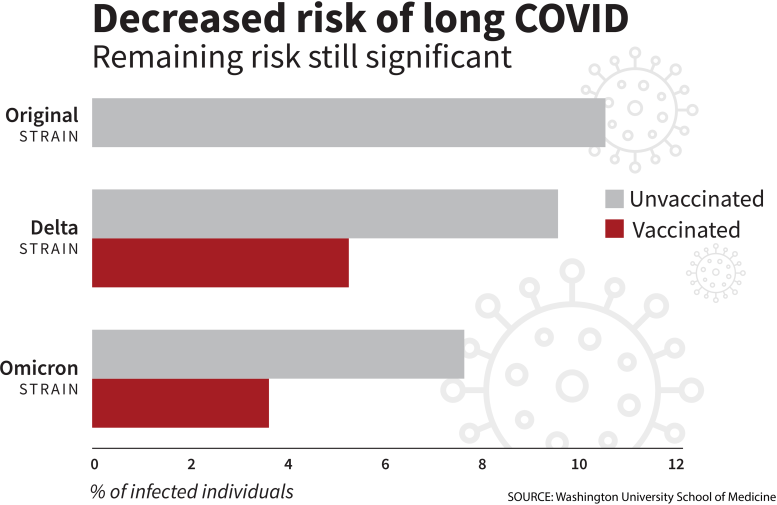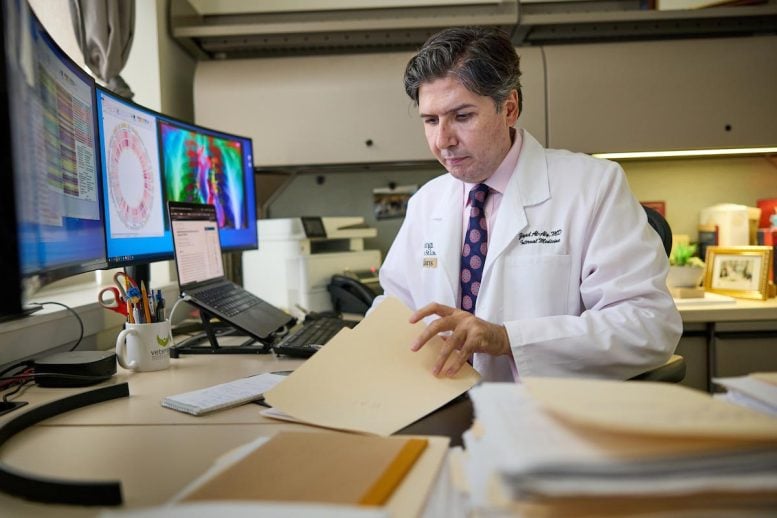
Research indicates a significant reduction in long COVID risk, largely due to vaccination and the virus’s evolution.
The study analyzes data from over 441,000 veterans, showing lower rates of long COVID among vaccinated individuals compared to their unvaccinated counterparts across different COVID-19 variants.
Decreased Long COVID Risk and the Role of Vaccination
The risk of developing long COVID has decreased significantly over the course of the COVID-19 pandemic, according to an analysis of data led by Washington University School of Medicine in St. Louis.
Researchers attributed about 70% of the risk reduction to vaccination against COVID-19 and 30% to changes over time, including the SARS-CoV-2 virus’s evolving characteristics and improved detection and management of COVID-19.
The research is published July 17 in The New England Journal of Medicine.
“The research on declining rates of long COVID marks the rare occasion when I have good news to report regarding this virus,” said the study’s senior author, Ziyad Al-Aly, MD, a Washington University clinical epidemiologist and global leader in COVID-19 research. “The findings also show the positive effects of getting vaccinated.”

Impact of Long COVID Across Organ Systems
Long COVID encompasses the lingering and debilitating effects on health experienced by about 10% of people who have been infected with COVID-19. To date, the World Health Organization has documented more than 775 million cases of COVID-19.
In more than 30 high-profile studies, Al-Aly has detailed the virus’s indiscriminate, long-term health impacts across nearly all organ systems affecting the heart, brain, kidneys and gastrointestinal (GI) tract.
Although his latest findings sound more reassuring than previous studies, Al-Aly tempered the good news. “Long COVID is not over,” said the nephrologist, who treats patients at Washington University-affiliated John J. Cochran Veterans Hospital in St. Louis. “We cannot let our guard down. This includes getting annual COVID vaccinations, because they are the key to suppressing long COVID risk. If we abandon vaccinations, the risk is likely to increase.”
Analyzing Long COVID Trends and Variants
Since the pandemic’s beginning, Al-Aly has dedicated himself to analyzing long COVID with the aim of helping the public make informed health choices; supporting scientists in generating research-backed recommendations on prevention and treatment; and enabling politicians to make educated decisions regarding funding and public policies. Al-Aly’s latest study builds on this body of work by examining the virus’s variants and overall evolution.
To do this, Al-Aly and his team analyzed millions of de-identified medical records in a database maintained by the U.S. Department of Veterans Affairs, the nation’s largest integrated health-care system. The study included 441,583 veterans with SARS-CoV-2 infections and more than 4.7 million uninfected veterans, from March 1, 2020, through Jan. 31, 2022.
Patients included people of diverse ages, races and sexes; statistical modeling ensured parity in representation.
The researchers divided the veterans into five groups: unvaccinated COVID-19 sufferers who acquired the original strain in 2020; the delta variant in 2021; and the omicron variant in 2022. The other two groups included vaccinated people who had the delta variant, and vaccinated people with omicron. No vaccines existed while the original strain circulated.

Vaccination Efficacy and Continuing Challenges
The team estimated rates of long COVID one-year postinfection for each of the five groups.
Unsurprisingly, the rate of long COVID was the highest among those with the original strain, Al-Aly said, with 10.4% of those who had infections that developed into long COVID.
That declined to 9.5% among those in the unvaccinated groups during the delta era and 7.7% during omicron.
Among the vaccinated, the rate of long COVID during delta was 5.3% and 3.5% during omicron.
“You can see a clear and significant difference in risk during the delta and omicron eras between the vaccinated and unvaccinated,” said Al-Aly, who is also director of the Clinical Epidemiology Center at the VA St. Louis Health Care System and head of the research and development service. “So, if people think COVID is no big deal and decide to forgo vaccinations, they’re essentially doubling their risk of developing long COVID.”
Al-Aly also emphasized that even with the overall decline, the lowest rate — 3.5% — remains a substantial risk. “That’s three to four vaccinated individuals out of 100 getting long COVID,” he said. “Multiplied by the large numbers of people who continue to get infected and reinfected, it’s a lot of people. This remaining risk is not trivial. It will continue to add an already staggering health problem facing people across the world.”
Evolution of the Virus and Its Diverse Impacts
Since the pandemic’s beginning, Ziyad Al-Aly, MD, a clinical epidemiologist at Washington University School of Medicine in St. Louis, has dedicated himself to analyzing long COVID with the aim of helping the public make informed health choices and educating scientists and policymakers on prevention and treatment. Al-Aly’s latest study in The New England Journal of Medicine builds on his research by examining the virus’s variants and overall evolution.
Another notable finding offers clues to the virus’s evolution, Al-Aly added. While analyzing the risk among all people infected with COVID-19 during the omicron era of 2022, the likelihood of heart, brain, kidney and lung problems declined. In contrast, diseases and illnesses associated with metabolic function and the GI system increased.
“People tend to think of SARS-CoV-2 as a homogeneous virus,” Al-Aly said. “But each variant has its own fingerprint. The original virus hit the respiratory system hard. Omicron targeted metabolic and GI issues. It’s important because while the risk of long COVID is quantitatively lower, a person can be at a higher risk of developing an illness based on the part of the body that the COVID variant targets.
“It’s really good news that the risk has declined,” he said. “But we know millions of people already have long COVID, and millions more will continue to get long COVID. We need to double down on our efforts to understand it so we can prevent suffering and treat affected individuals.”
Reference: “Postacute Sequelae of SARS-CoV-2 Infection in the Pre-Delta, Delta, and Omicron Eras” by Yan Xie, Taeyoung Choi and Ziyad Al-Aly, 16 July 2024, New England Journal of Medicine.
DOI: 10.1056/NEJMoa2403211
This research was funded by the U.S. Department of Veterans Affairs.